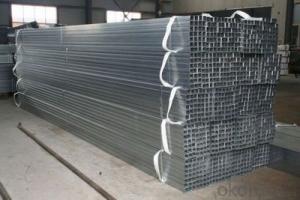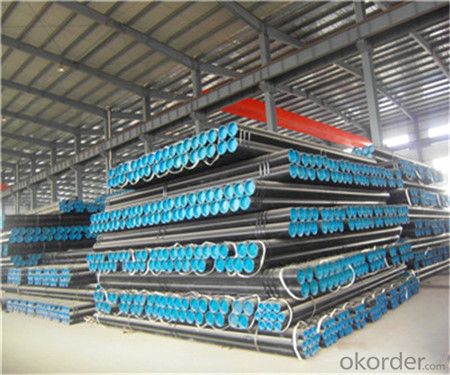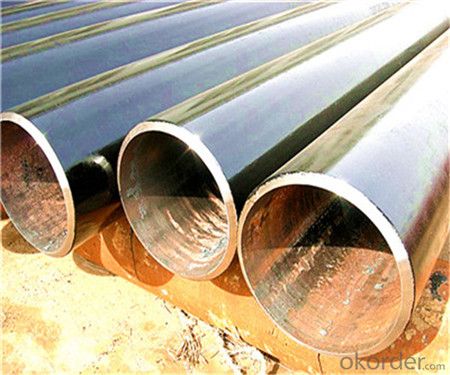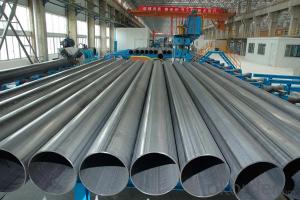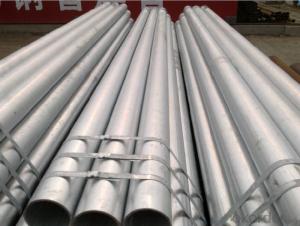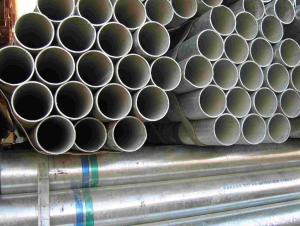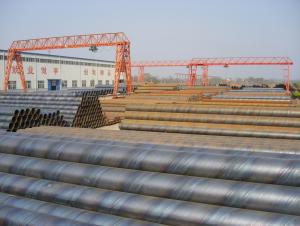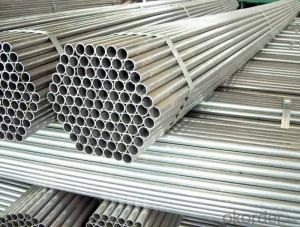Galvanized Steel Square Pipe/ASME ANSI JIS GB Q195--Q345
- Loading Port:
- Tianjin
- Payment Terms:
- TT or LC
- Min Order Qty:
- 25 m.t.
- Supply Capability:
- 15000 m.t./month
OKorder Service Pledge
OKorder Financial Service
You Might Also Like
1、Structure of Galvanized Steel Square Pipe:
Seamless pipe is formed by drawing a solid billet over a piercing rod to create the hollow shell. As the manufacturing process does not include any welding, seamless pipes are perceived to be stronger and more reliable. Historically seamless pipe was regarded as withstanding pressure better than other types, and was often more easily available than welded pipe.
2、Main Features of Galvanized Steel Square Pipe:
• High manufacturing accuracy
• High strength
• Small inertia resistance
• Strong heat dissipation ability
• Good visual effect
• Reasonable price
3、Galvanized Steel Square PipeSpecification:
Standard | GB, DIN, ASTM ASTM A106-2006, ASTM A53-2007 |
Grade | 10#-45#, 16Mn 10#, 20#, 45#, 16Mn |
Thickness | 8 - 33 mm |
Section Shape | Round |
Outer Diameter | 133 - 219 mm |
Place of Origin | Shandong, China (Mainland) |
Secondary Or Not | Non-secondary |
Application | Hydraulic Pipe |
Technique | Cold Drawn |
Certification | API |
Surface Treatment | factory state or painted black |
Special Pipe | API Pipe |
Alloy Or Not | Non-alloy |
Length | 5-12M |
Outer Diameter | 21.3-610mm |
Grade | 20#, 45#, Q345, API J55, API K55, API L80, API N80, API P110, A53B |
Standard | ASME, ASTM |
1) Material:20#(ASTM A 106/A53 GRB.API5LGRB,GB),45#,16Mn,10#.
2) Specification range:OD:21.3-610mm,WT:6-70mm,length:6-12m or according to the requirement of clients.
3) Excutive standards:GB,ASME API5L.ASTM A 106/A53,Despite of the above standards,we can also supply seamless steel pipe with standard of DIN,JIS,and so on,and also develop new products according to the requirements of our clients!
4) Surface:black lacquered,varnish coating or galvanized.
5) Ends:Beveled or square cut,plastic capped,painted.
6) Packing:bundles wrapped with strong steel strip,seaworthy packing.
4、Packaging & Delivery
Packaging Details: | seaworthy package,bundles wrapped with strong steel strip |
Delivery Detail: | 15-30days after received 30%TT |
5、FAQ of Galvanized Steel Square Pipe
①How is the quality of your products?
Our products are manufactured strictly according to national and internaional standard, and we take a test
on every pipe before delivered out. If you want see our quality certifications and all kinds of testing report, please just ask us for it.
Guaranteed: If products’ quality don’t accord to discription as we give or the promise before you place order, we promise 100% refund.
②How about price?
Yes, we are factory and be able to give you lowest price below market one, and we have a policy that “ for saving time and absolutely honest business attitude, we quote as lowest as possible for any customer, and discount can be given according to quantity”,if you like bargain and factory price is not low enough as you think, just don’t waste your time.Please trust the quotation we would give you, it is professional one.
③Why should you chose us?
Chose happens because of quality, then price, We can give you both.Additionally, we can also offer professional products inquiry, products knowledge train(for agents), smooth goods delivery, exellent customer solution proposals.Our service formula: good quality+good price+good service=customer’s trust
SGS test is available, customer inspection before shipping is welcome, third party inspection is no problem.
6、Galvanized Steel Square Pipe Images:
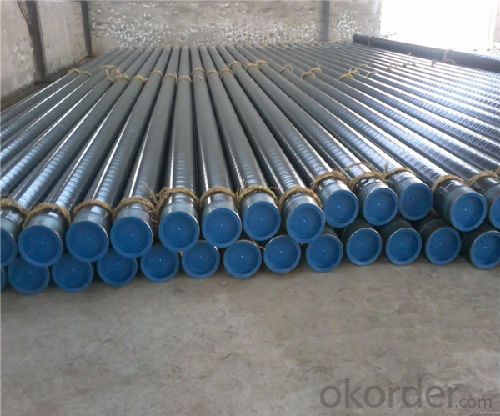
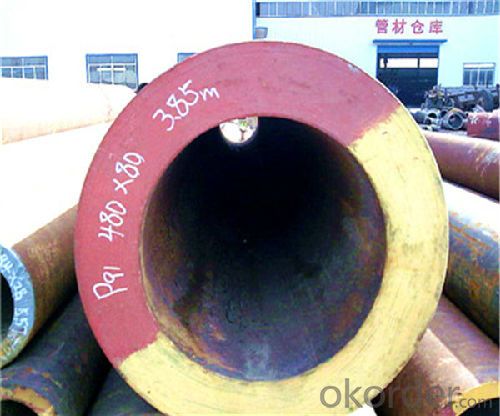
- Q: How are steel pipes used in the construction of wastewater treatment plants?
- Steel pipes are used extensively in the construction of wastewater treatment plants for various purposes. They are used for the transportation of wastewater from one unit to another, as well as for the distribution of treated water to different areas. Steel pipes are also used in the construction of the main water supply and drainage systems within the plants. Additionally, they are utilized for the installation of pumps, valves, and other equipment required for the treatment process. The durability and strength of steel pipes make them an ideal choice for the demanding and corrosive environment of wastewater treatment plants.
- Q: Are steel pipes affected by UV rays?
- Yes, steel pipes can be affected by UV rays. Over time, exposure to UV radiation can cause the steel to degrade and weaken. It can lead to surface oxidation, discoloration, and in extreme cases, structural damage. To prevent this, protective coatings or paint can be applied to shield the steel pipes from UV rays.
- Q: What are the advantages of using pre-fabricated steel pipes?
- There are several advantages of using pre-fabricated steel pipes in various applications. Firstly, pre-fabricated steel pipes offer a high level of durability and strength. Steel is known for its robustness and resistance to external forces, making it an ideal material for constructing pipes that need to withstand high pressure or heavy loads. This durability ensures that pre-fabricated steel pipes have a longer lifespan compared to other materials, reducing the need for frequent replacements and maintenance. Secondly, pre-fabricated steel pipes provide excellent corrosion resistance. Steel pipes are often coated with protective layers, such as galvanization or epoxy, which prevent rusting and corrosion. This corrosion resistance is particularly crucial when the pipes are used in industries or environments where they may come into contact with moisture, chemicals, or other corrosive substances. By utilizing pre-fabricated steel pipes, the risk of leaks, deterioration, or failure due to corrosion is significantly reduced. Another advantage of pre-fabricated steel pipes is their versatility and ease of installation. These pipes are manufactured to precise specifications before being delivered to the site, allowing for quick and efficient installation. Their modular nature means that they can be easily assembled, disassembled, and reconfigured as needed, making them suitable for a wide range of applications, from industrial settings to residential construction. Moreover, pre-fabricated steel pipes can be easily integrated with other building components, such as fittings, valves, and connectors, ensuring a seamless connection and reducing installation time and costs. Furthermore, pre-fabricated steel pipes are more environmentally friendly compared to other materials. Steel is a highly recyclable material, and using pre-fabricated pipes reduces the consumption of natural resources and energy required for their production. Additionally, the long lifespan of steel pipes reduces waste generation and the need for frequent replacements, further contributing to sustainability efforts. Lastly, pre-fabricated steel pipes offer cost advantages. While the initial cost of steel pipes may be higher than some other materials, their durability and low maintenance requirements result in long-term cost savings. The reduced need for repairs, replacements, and maintenance, as well as the ease of installation, translates into lower overall project costs and reduced downtime. In summary, the advantages of using pre-fabricated steel pipes include durability, corrosion resistance, versatility, ease of installation, environmental friendliness, and cost-effectiveness. These benefits make pre-fabricated steel pipes a preferred choice for various industries and applications.
- Q: How do you calculate the pipe thermal expansion for steel pipes?
- In order to calculate the thermal expansion of steel pipes, one must take into account the material's coefficient of thermal expansion (CTE), the temperature fluctuation, and the pipe's length. The CTE represents the extent to which a material expands or contracts in response to temperature changes. For steel, the average CTE is typically approximately 12 x 10^-6 per degree Fahrenheit (or 6.5 x 10^-6 per degree Celsius). However, this value may vary depending on the specific grade of steel. Subsequently, the temperature change that the pipe will encounter must be determined. This can be the discrepancy between the operating temperature and the ambient temperature, or the temperature variation caused by the fluid or gas flowing through the pipe. Finally, the thermal expansion can be calculated using the following formula: Thermal Expansion = CTE x Length x Temperature Change Where: - CTE signifies the coefficient of thermal expansion - Length denotes the pipe's length - Temperature Change represents the temperature difference For instance, if a steel pipe has a length of 10 meters (32.8 feet) and experiences a temperature change of 100 degrees Celsius (180 degrees Fahrenheit), assuming a CTE of 12 x 10^-6 per degree Celsius, the thermal expansion would amount to: Thermal Expansion = 12 x 10^-6 x 10 x 100 = 0.012 meters (or 12 millimeters) This means that the pipe would expand by 12 millimeters due to the temperature alteration. It is important to note that this calculation provides an approximation of the thermal expansion. However, other factors such as pipe supports, restraints, and the specific application should also be taken into consideration to ensure the proper design and installation of the steel pipe system.
- Q: Are steel pipes suitable for use in coastal areas?
- Yes, steel pipes are suitable for use in coastal areas. Steel is highly durable and resistant to corrosion, making it an ideal choice for withstanding the harsh conditions typically found in coastal environments, such as saltwater, high humidity, and strong winds. Additionally, steel pipes offer excellent strength and stability, ensuring their longevity and reliability in coastal applications.
- Q: What is the weight and strength of steel pipes?
- The weight and strength of steel pipes can vary depending on the specific type and dimensions of the pipe. Steel pipes can range in weight from lightweight options used for plumbing purposes to heavy-duty pipes used in industrial applications. Similarly, the strength of steel pipes can vary, with factors such as the grade of steel and the manufacturing process influencing their strength. It is essential to consult specific specifications or industry standards to determine the weight and strength of a particular steel pipe.
- Q: What are the applications of galvanized steel pipes?
- Galvanized steel pipes have a wide range of applications in various industries. They are commonly used in plumbing systems to deliver water and gas due to their excellent corrosion resistance. Additionally, they are used in the construction industry for structural purposes, such as scaffolding, fences, and handrails. Galvanized steel pipes are also utilized in the agricultural sector for irrigation systems and as posts for supporting crops. Furthermore, they find usage in oil and gas pipelines, HVAC systems, and automotive manufacturing. Overall, the applications of galvanized steel pipes are diverse, making them an essential material in multiple sectors.
- Q: What are the factors affecting the durability of steel pipes?
- There are several factors that can affect the durability of steel pipes. These include corrosion, temperature fluctuations, mechanical stress, and exposure to chemicals or abrasive materials. Additionally, the quality of the steel used in the pipes, the design and construction of the piping system, and proper maintenance and inspection practices can also impact their durability.
- Q: How are steel pipes used in the manufacturing of food processing equipment?
- Steel pipes are commonly used in the manufacturing of food processing equipment due to their durability, strength, and resistance to corrosion. These pipes are used to transport various food products such as liquids, powders, and gases within the equipment. They are also utilized in the construction of frames, supports, and structures for food processing machinery, ensuring stability and longevity. Additionally, steel pipes are often employed in the creation of heat exchangers, which are crucial for heating or cooling purposes in food processing equipment.
- Q: What is the maximum operating temperature for steel pipes?
- The maximum operating temperature for steel pipes can vary depending on the grade of steel used, but it is generally around 1000°C (1832°F) for standard carbon steel pipes.
Send your message to us
Galvanized Steel Square Pipe/ASME ANSI JIS GB Q195--Q345
- Loading Port:
- Tianjin
- Payment Terms:
- TT or LC
- Min Order Qty:
- 25 m.t.
- Supply Capability:
- 15000 m.t./month
OKorder Service Pledge
OKorder Financial Service
Similar products
Hot products
Hot Searches
Related keywords
